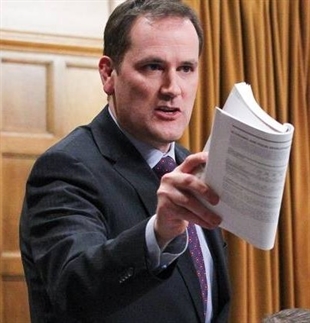
Dan Albas a Member of Parliament.
Image Credit: SUBMITTED/Dan Albas
December 10, 2017 - 12:00 PM
OPINION
The headlines coming out of Ottawa this week were unrelenting:
"Trudeau's trade deal with China turns into an embarrassment" and "Trudeau breaks the three rules of doing business in China, leaves Beijing empty-handed"
At issue was a press conference in Beijing where it was widely expected that the Prime Minister would announce that Canada and China were entering into formal trade talks.
That did not occur and even at the present moment it is unclear what the current status is of talks between Canada and China that are trade related.
The rumoured stumbling block is the Trudeau Government's insistence on demanding what they call "Progressive Trade".
What is "Progressive Trade"?
Based on the Government's own definition, it is a trade deal that also has guarantees on topics such as labour, gender and environmental rights that are not normally part of a free trade agreement.
There are many criticisms of this progressive trade policy -- as an example would Canadians accept societal values from another country demanded upon us in order to accept a trade deal?
I suspect many Canadians would not.
So it is no surprise that this progressive trade approach has been rejected in NAFTA, TPP and now Chinese trade-related discussions thus far.
Why does the Liberal Government insist on "progressive trade" language?
It has been suggested this language is more aimed for Canadians to hear back at home, for political reasons.
Obviously, this is also confusing for our potential trading partners.
However, I believe there is another aspect to this.
For example, the Trudeau Liberals have insisted on a national carbon tax here in Canada. In the event Canada enters into a free trade agreement with a country that does not have a national carbon tax, our producers and manufacturers would be at a competitive disadvantage.
Likewise, Canada has significant worker protections with social programs such as EI, CPP, parental leave, medical leave, the right to collective bargaining and more. Other countries, particularly China, do not typically offer similar protections for workers. As many of these programs are funded in part by employers once again a competitive disadvantage would be created in a free trade agreement.
Canada already has a trade deficit with China of roughly $45 billion annually and growing. Obviously there many other concerns related to Chinese human rights and environmental policies or lack thereof.
In addition, past cyber-attacks on Canadian Institutions such as the National Research Council that Communications Security Establishment Canada identified as coming from a "highly sophisticated Chinese state-sponsored actor" have yet to be referred by the Trudeau Liberals as they continue to negotiate with China behind closed doors.
My question this week: Are you in support of a "Progressive Trade" deal with China?
I can be reached at Dan.Albas@parl.gc.ca or call toll free at 1-800-665-8711.
— Dan Albas is the Member of Parliament for the riding of Central Okanagan Similkameen Nicola, serving the communities of Kelowna (specific boundaries), West Kelowna, Peachland, Summerland, Keremeos, Princeton, Merritt, and Logan Lake.
We welcome your comments and opinions on our stories but play nice. We won't censor or delete comments unless they contain off-topic statements or links, unnecessary vulgarity, false facts, spam or obviously fake profiles. If you have any concerns about what you see in comments, email the editor.
News from © iNFOnews, 2017